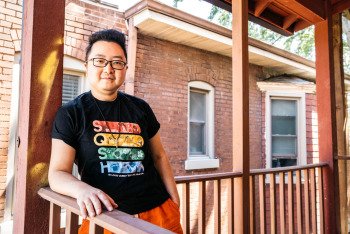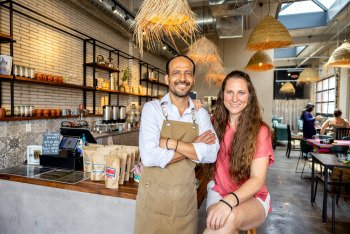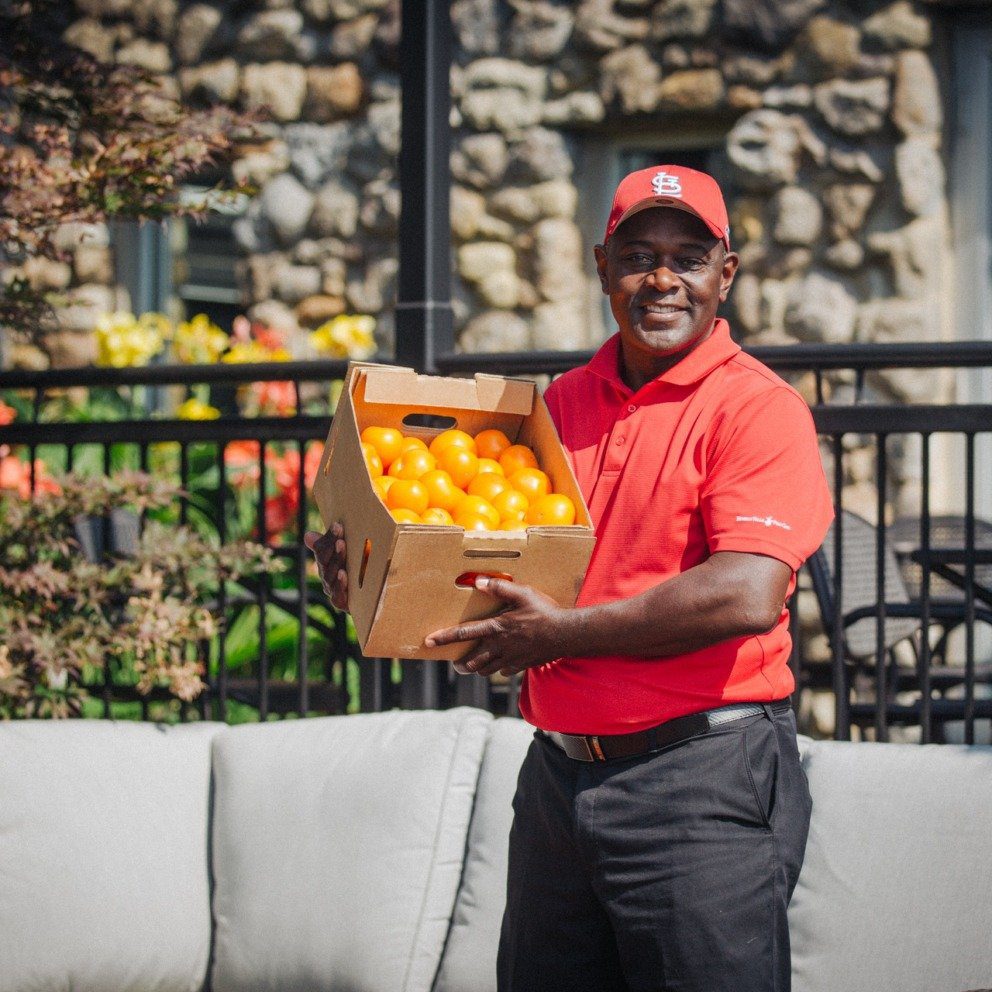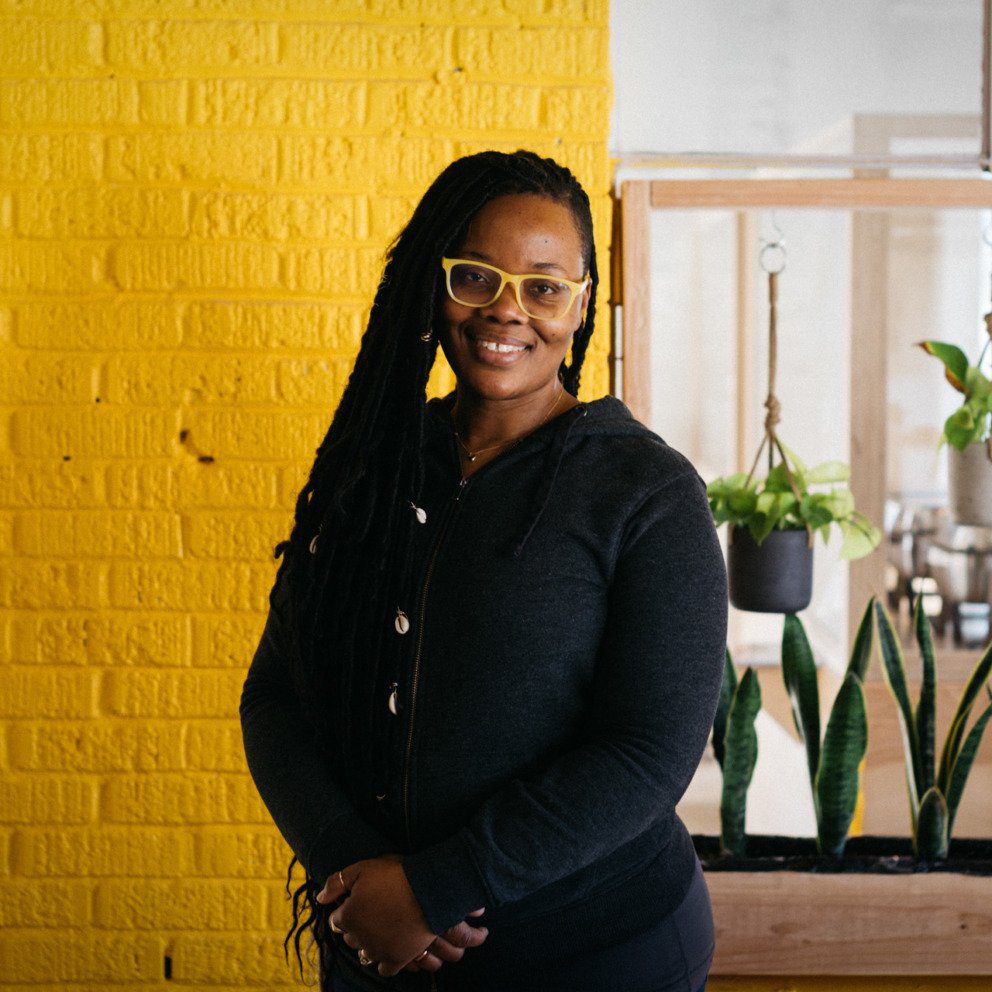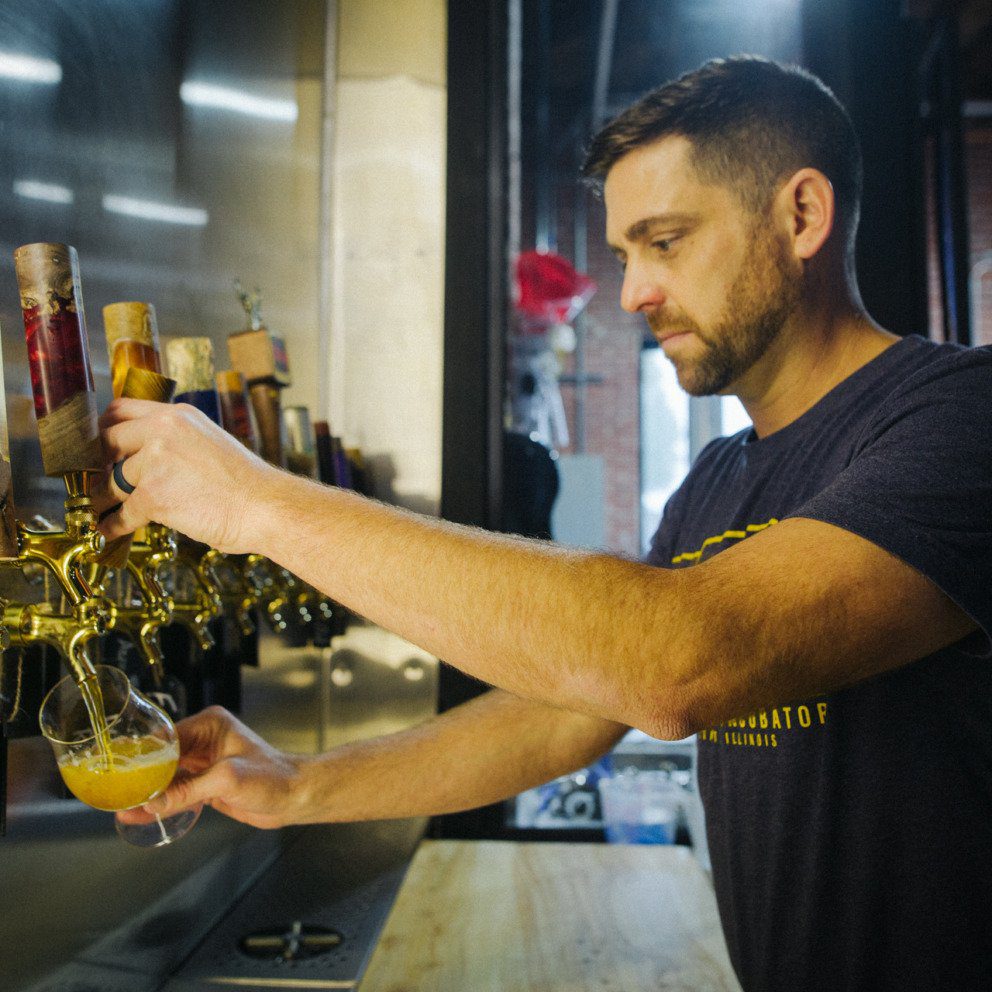Organic Growth
In Wright City, Maria Marshall leads certified organic Marshall Family Farms in practicing regenerative agriculture, raising heritage poultry and producing heirloom crops.
Most animals involved in a tussle with a great horned owl do not survive. Gaston refused to give up so easily.
One of several roosters at Marshall Family Farms in Wright City, Missouri, just west of St. Louis County, Gaston understands his duty to protect the flock of rare chicken breeds. When the flock is threatened, Gaston will make a little sound that owner Maria Marshall describes as whispering under his breath.
When they hear it, the hens know to go inside the chicken house while Gaston assumes a lunge position in front of the door.
He didn’t come out of the tussle with the great horned owl unscathed; he lost 20 percent of his feathers and Marshall performed first aid for the gashes on his chest.
“He survived and he’s thriving now,” she says, “and the hens love him even more after that – when he showed, ‘I would die for you. I would lay down my life for you.’ And he survived. Having that sort of diversity in the flock is just so important.”
Marshall Family Farms raises heritage poultry – chickens and ducks – as part of its mission towards regenerative agriculture and biodiversity. Of the six acres in Wright City, about one acre is used for cash crops, and the rest as grazing grounds for the chickens, ducks and horses, plus a half-acre pond.
Marshall, who runs the farm alongside her partner, Mike McManus, and her mother, Marisa Marshall, moves the chicken houses at least once a day, sometimes more. She sees the marriage of animals and crops as imperative to any truly regenerative farm.
“It basically means that whatever practices you are implementing on a farm are adding to the land rather than retracting,” Marshall explains. “If you’re doing any sort of organic or regenerative agriculture, you kind of have to have poultry. Chickens eat a lot of things, so there’s not really farm waste: If I don’t sell something at the farmers market, like onions, I chop them up and give them to our chickens. That only makes their eggs better. They probably ate a pound of cherry tomatoes today when we were harvesting for our community supported agriculture program, so that orange pigment’s going to transfer to their yolks, and their yolks are going to be even more orange.”
Marshall stresses that waste is often a huge issue on farms, going hand in hand with exhausting the land.
“An entire field might be eaten up by beetles. For most farms, that would be devastating,” she says. “But for me, what I could do is get my ducks and move their house over to that field, put a fence around it, and they will literally eat every single bug in existence. It’s good pest control and waste management. If I’m done with a field, I’ll have the chickens come and eat, clear out all the weeds and mix up the soil with their claws. They’re like my coworkers – they do so much work for the farm. It’s so amazing how beautiful they can make the land.”
Marshall was always an outdoor person – “a Steve Irwin kid” as she puts it – so it seemed like a natural progression for her to study horticulture and botany. Her interest lay in doing something positive for the world. She began studying horticulture at a community college, and planned to transfer to a California university to earn a botany or environmental science degree.
At the same time, her mother Marisa Marshall was in the process of transitioning her own father’s conventional farm into an organic farm. Maria Marshall helped out as often as she could. Soon, she began to see a disparity between the Wright City farm and her horticulture classes.
“Learning with my mom about organic farming, and contrasting that with my horticulture class where we’re going to a flower factory to learn that, ‘We stick the flowers in this chemical to make them last this long. If we have to send them to this state, we stick them in these chemicals.’ It was very dystopian to me… It’s interesting, it’s beautiful, it’s necessary; there’s people that are made for that sort of work with test tubes and stuff,” says Marshall. “But I quickly realized that wasn’t going to be who I was and what would make me happiest.”
Marshall was working multiple part-time jobs while going to the school, helping her mom as often as she could on the farm and playing with the idea of being a full-time farmer. It got to the point where she was so overloaded that she was hospitalized for several days. The time spent recovering in the hospital helped clarify her priorities.
“I realized, I’m not going to waste any time doing something I’m unhappy about,” says Marshall. “I realized I really like farming.”
That love of farming has led to running operations at Marshall Family Farms, alongside her mother and partner. Her father Doug, a former carpenter, does all manner of woodworking at the farm, like building chicken houses, and worked with Marshall’s brothers and brother-in-law to build greenhouses. Her sister helps with social media and responding to customers.
“My whole family pitches in, but it’s pretty much a three-person show, honestly,” Marshall says.
However, she says the farm may never have gotten off the ground if it weren’t for her dad’s tamales.
When Marisa was working to convert the property to an organic farm, around 2014, there was a waiting list to get into St. Louis-area farmers markets. Doug got the idea to become a food vendor at a farmers market to get their foot in the door; they could get to know the market managers so that when the farm was ready, they’d have an in.
“He grew up in north St. Louis, where there was this man who would just push around a tamale cart and sell tamales throughout the entire neighborhood,” says Marshall. “We’re all Latin – his dad was white, but his mom was Mexican, so he grew up learning how to make tamales.”
Doug decided tacos were too much prep and had too many ingredients, but if he sold tamales, he could use chicken and produce from the farm. The Tamale Man was born.
“My dad was Marshall Family Farms’ first customer,” Marshall says with a laugh. “It’s a huge thing at the market now. It’s something super unexpected that we never thought would blow up to the level that it did. It’s amazing to watch.”
At Marshall Family Farms, a typical day starts around 4 a.m. – earlier in the hottest days of summer. Marshall, her partner and her mother have a cup of coffee and plan out the day. Around dawn, they let the chickens out and feed the ducks. Mid-day is usually a time for weeding, followed by lunch. During the summer when the day starts around 2 or 3 a.m., they all take naps. “Siestas are a must in my family just because of how much we work,” Marshall says.
Later in the afternoon, when the sun isn’t as punishing, the team will do planting and irrigation. At dusk, they put the chickens up and move their houses. During farmers market season, on Wednesday nights they don headlamps to harvest into the wee hours of the morning for their CSA boxes and farmers market wares. Flavor and nutrients are more concentrated at nighttime, when they aren’t being sapped by the sun, so this is a prime time to harvest ahead of sale.
The farm’s CSA program provides subscribers with a weekly box full of a variety of seasonal produce – even more than is available at the Tower Grove Farmers Market.
“I would really love to see the CSA get bigger, because it introduces people to their new favorite food,” Marshall says. “There’s a lot of things that you don’t see at the farmers market, a lot of diversity in things that aren’t being consumed simply because they can’t be industrialized. That’s such a shame because there’s such a huge variety of foods and colors.”
Marshall’s CSA and farmers market offerings include, at various times, sunrise bumblebee tomatoes, lemon balm, golden beets, Dragon’s Tongue snap beans and Flashy Trout’s Back Speckled Romaine – plus, of course, multicolored duck and chicken eggs.
When they first started raising chickens, the Marshalls went with the most common breed in the U.S., the Cornish Cross.
“It was so much more stressful. They were so much more agitated,” Marshall says, explaining that the breed essentially is all cloned to replicate the popular attributes. “Chickens have a hierarchy, they have rules of their own, mannerisms and customs.”
Today, Marshall raises 18 breeds of heritage poultry, which she feels makes the flock even stronger.
“We have our bigger French Black Copper Marans, and they are like the muscle of the flock. They watch out for hawks the best and keep everyone in line,” she says. “Our Ameraucanas and our Easter Eggers – they forage better. They’re more explorative, adventurous and smaller, so they can get in all of the nooks and crannies that the bigger girls couldn’t. It’s so amazing. They’re so interesting and diverse, and they have such personality.”
Ultimately, Marshall Family Farms aims to contribute to the local ecosystem instead of draining it.
“Know your farmer. Grow that connection to your food. It’s so much more than ‘This is low in calories or high in protein,’” she says. “It’s creating that connection to the land that’s around you. The more connection that people have to their farmers, their food, their local environment, the more they’re going to care for it, and certain decisions are going to be made with greater consideration.”
“Know where your food comes from, because it’s so important to not commodify something so crucial to not only your wellbeing, but the wellbeing of the planet.”
Join the Story
- Follow Marshall Family Farms on Instagram for stories about their crops and poultry.
- Check out Marshall Family Farms and many other vendors at an upcoming Tower Grove Farmers Market.
- Order tamales for pick-up or delivery from The Tamale Man.
- Sign up for the Marshall Family Farms CSA program.


